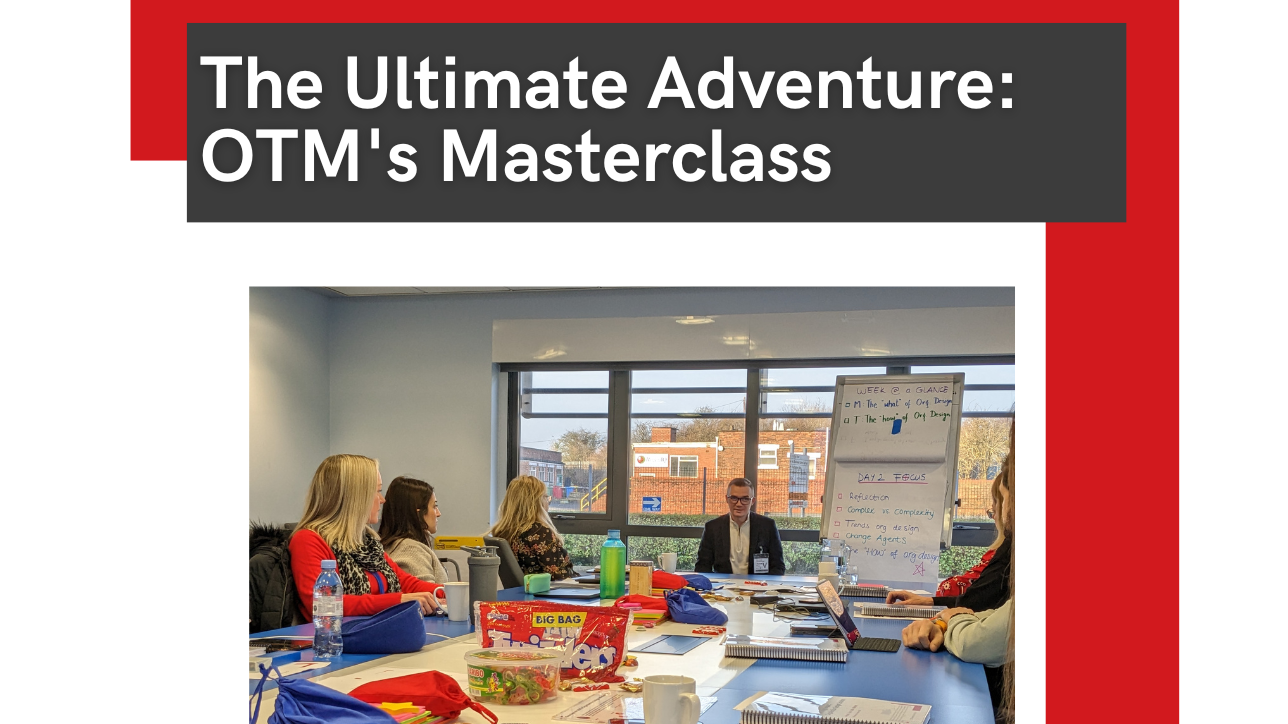5 Minute Read
Takeaway: ON THE MARK has a growing community of more than 5000+ alumni in 35+ countries trained in the OTM Org Design proprietary methodology. Several Masterclass participants have ensured their colleagues and teams attend the Masterclass to enable a shared language and thinking model for change initiatives within their organisations, and to unlearn and expand their business knowledge, networks, and impact.
Experiencing my first in-person OTM 5 day’s Org Design Masterclass at the magnificent Victrex facility in Blackpool was like witnessing the matrix movie playing in real time – business leaders choosing to see the real from the unreal. It was like witnessing my Masters theories on Cognitive and Social Constructivism learning in live action – immersive collaborative, assimilation and accommodation of new information by participants, with extensive focus on group work and solving practical case methods.
The participants were a community of top business and public sector leaders from the US, China, Germany, and the UK committed to empowering and evolving their organisations.
Each session involved sharing tool kits, templates, cases, and top trends that helped participants assess, evaluate, and design Operating Models to drive business goals and generate culture shift, sustainability, and enhanced employee experience. A unique ‘Panel of Possibilities’ session was held on Day 2 which was essentially a leadership event wherein 3 pioneering leaders (Jilly Atherton, David Beacham, and Martin Hackett) focused on breaking down their best practices enabling organisations to modernise their Operating Models and create lasting change.
As we march towards 2023 and businesses around the world restructure and reconfigure their ways of working, it is more important than ever to learn from each other’s experiences and journeys toward building better Operating Models that build real value. This article aims to share my experience of the ultimate org design masterclass, as witnessed by participants.
A Desire To Learn
The path to developing Org Design skills is different for everyone. Participants saw the Masterclass as an investment for themselves, to enhance their skills, develop frameworks for managing org design work and grow as a leader in their organisations.
Some participants also shared that they wished to gain diverse perspectives and viewpoints from their fellow participants. The 3 major reasons that participants enrolled for the Masterclass consisted of the following:
- Upskilling on practical Org Design tools, techniques, and methods
- Managing change initiatives
- Enhancing communication and influencing skills
A Positive Challenge
The Masterclass challenges people to think differently. It is designed to foster clarity through a journey of practical case-based discussion and dialogue.
Some challenges as mentioned by participants are noted below:
- “The terminology is something that challenged me.”
- “The framework is relatively simple but when you get into it, it’s detailed.”
- “I’m pretty overwhelmed by the scale of change we are undergoing, but I understood the importance of Business Direction.”
- “Going from macro to micro – from org level to people level – that fluctuation was challenging.”
The Aftermath
The Masterclass helped broaden participants’ worldviews and allowed their opinions to be challenged by peers from different geographies and industries. The knowledge of the collective led to tremendous personal growth and deeper business intuition. Some learnings as stated by participants are mentioned below:
- “To not get into autopilot mode and get into functional structures, but rather ‘follow the work‘.”
- “Focus on competitive advantage.”
- “Keep people on track without going down the same lane of a conventional change management approach.”
- “I like the focus on the Business Direction aspect of the OTM Applied STAR.”
- “I enjoyed the focus on Value Stream – people can change strategy, but the mastery is in the value stream.
- “I understand the interconnectivity of the levers – if you are thinking of pulling one lever (say, doing a capability building program), then the impact it has on the whole org is powerful and so planning and building around that is key.”
- “The deep psychological tools and methods – the engagement, willingness, ownership versus being done to you, that’s a huge part of my learning.”
- “It’s quite refreshing as you are truly bringing people into the change process, so they truly own it.”
- “Practical exercises to apply the learnings and that all levers are integrated, and holistic.”
- “Theory is my natural direction, however, the front side of Business Direction and Value Stream is what was revealing to me.”
- “This is a new toolkit for me, and I can see myself using this in my day-to-day questioning to draw out collaboration and change.”
The OTM Org Design workshop is truly a world-class program that challenges and fosters skill-building through hands-on, practical, and interactive group engagement.
The OTM workshop experience helps develop a critical lens to inform one’s view of organisations and the world for rest of life, which I think more than justifies the investment people make.
Over the 5 days, the participants learned from each other’s experiences and journeys toward org empowerment and evolution while gathering valuable insights on an organisation’s ability to navigate change.
The meaningful connections participants built in the 5 days weren’t just created amongst themselves, but with the OTM facilitators too. Beyond the training, OTM facilitators serve as mentors and advisors to participants and connect participants with their professional networks to support and advance their careers.
Don’t miss out on the opportunity to gain valuable Org Design insights and become part of a community of like-minded professionals. Take a step in empowering and evolving your organisation and join our next Org Design Masterclass!
Rahul Lama is a Support Consultant at ON THE MARK. OTM is a global leader in collaborative operating model modernization that creates real change, fast. OTM’s passion for collaborative business transformation is supported by pragmatism, systems thinking, and a belief in people that is unparalleled for 34 years.


